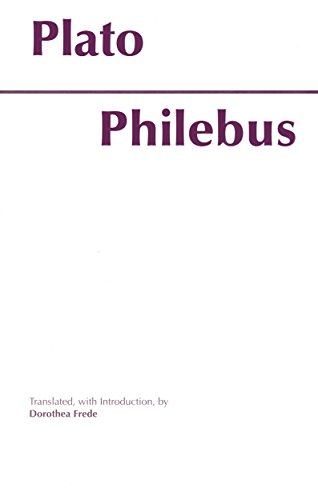Customer Services
Copyright © 2025 Desertcart Holdings Limited


Full description not available
A**S
Is There Any Reason to Read Plato’s Late Dialogues?
In the Philebus Socrates returns as the interlocutor seeking an answer to the perennial question of whether pleasure or knowledge is more important to the good life.If you are interested in a serious examination of this question, you should turn to a modern neuroscientific approach such as the works of Robert Sapolsky. Plato’s approach is full of fallacious ideas such as essentialism, body/soul dualism, etc.But as a readable example of what Plato was thinking in his days as the head of the Academy it is an interesting historical document. One can see the influence on works such as the Nicomachean Ethics and Metaphysics of Aristotle. And one can see how the Socratic elenchus was developed by Plato into the pre-scientific approach of the dialectic. This also finds its development in the logical works of Aristotle.Besides historical interest, the Philebus is itself pleasant to read since, of all the late works of Plato, the Philebus probably has the closest resemblance to the early and middle dialogues where the personalities of the participants are brought into play.As for the edition, the introduction and translation by Dr. Frede allows those without prior knowledge of the Philebus to understand and enjoy the dialogue. Those planning to use this for coursework should note that Frede offers only her personal interpretation of the text and does not discuss scholarly controversies.Recommended for fellow lovers of Plato and ancient Attica.
S**E
The most readable translation of Plato I have read yet
I have read several Hackett translations of Plato and Hackett always publishes quality translations. Not only are they affordable but the introductions and notes that accompany them are always extremely helpful for understanding what are often difficult texts. Dorthea Frede's translation of the Philebus is by far the best translation of any Plato I have read. I've read the Phaedo, the Timaeus, and the Republic and found all of them to be confusing at some points and nearly impenetrable at other points. However, Dorothea's translation of the Philebus is extremely clear, even when Plato is not, and that is a great accomplishment considering the text was translated into English by a non-native speaker of the language.I highly recommend this translation.
S**A
Nice, cheap translation with great notes
First off, this is an amazing dialogue that is completely underrated and under-read. It discusses the nature of pleasure and whether the good life is closer to pleasure or knowledge.The translation in this edition is very good. The notes are really helpful as is the introduction.
B**R
Three Stars
Wasn't in as good of shape as anticipated.
H**Y
Five Stars
:)
V**H
Happiness as a mix of pleasure and insight
The eternal rivalry between pleasure and insight about the good and happy life represents the main question of Plato's Philebus. With the rapprochement from different perspectives, Plato finally gets to the conclusion that the happy life consists in a good mix of pleasure and insight. Within the scope of his hassle, Plato develops a very differentiated and interesting conception of pleasure. Thereby he gets to the conclusion that pleasure is influenced by opinions and that it sometimes even consist of an opinion.
D**K
A mixture of pleasure and reason.
Philebus is a tremendous read! The dialogue is between Socrates, Philebus and Protarchus, although Philebus gives a minor contribution. The conversation is about hedonism, in that Philebus declares that pleasure is the greatest attainable good. Socrates objects and claims that reason, knowledge and intellect are closer to the good. Socrates speculates on the the differing intensities of both pleasure and pain; explores the notion that they can be divided into pure and impure types, for example a little pure white paint is better than a lot of impure white paint. He also considers the relationship between the one and the many; and establishes knowledge as the higher goal. Socrates defines four categories, the indeterminate, limit, a mixture of them both and the cause of the mixture. He then places pleasure and reason into these categories. Socrates then tries to decide whether reason and pleasure should fall into second or third place etc in the good life? I think in the end Plato goes for a mixture of pleasure and reason. Philebus is a riveting read, and I highly recommend it to anyone interested in Classical Greek philosophy.
R**Z
Introducción
Valiosa introducción de D. Frede
Trustpilot
1 month ago
2 weeks ago